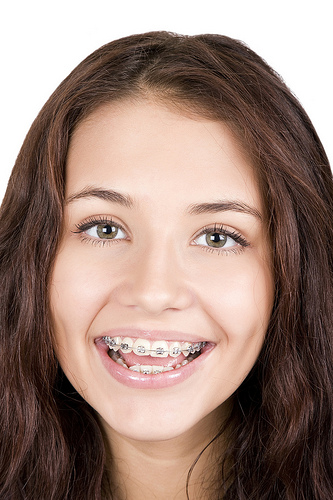July 30th, 2015

A bright, beautiful smile is often achieved with braces. The time you spend wearing braces is an investment in the good health and appearance of your smile. However, Dr. Daniel Ma and our staff know that having braces on your teeth can pose challenges. Many of these challenges are commonly faced by all who wear braces, such as flossing, getting food stuck in your braces, and bad breath.
Today, let’s address bad breath and what to do about it. There’s no reason you have to shy away from conversation for fear that you’ve got bad breath.
Fresh Breath Tips for Braces Wearers
- Eat a Healthy Diet. Unhealthy foods that are laden with sugar can contribute to bad breath. Stick with healthy produce, protein, grains, and dairy found on the list of foods your orthodontist says are safe to eat with braces.
- Drink Non-Sugary Beverages. Likewise, steer clear of sugary sodas and juices for the same reason. They contribute to bad breath.
- Stay Hydrated. A mouth that’s continually dry can lead to bad breath by inhibiting your production of saliva. Regular production of saliva removes bacteria and excess food from your mouth, both of which cause bad breath.
- Brush Often. Brush your teeth and tongue first thing in the morning, after each meal and snack, and before you go to bed, to remove food particles and bacteria that cause bad breath.
- Don’t Forget to Floss. Flossing with braces might seem tricky, but it is a necessity. Ask Dr. Daniel Ma to show you the best way to floss effectively with braces.
- Mouthwash Use. Use the mouthwash recommended by Dr. Daniel Ma. For the best results, swish the mouthwash around in your mouth for 30 seconds.
- Get Regular Cleanings. Regular dental exams and cleanings are more important when you have braces. Cavities can delay your treatment progress, so be sure to visit your dentist every six months.
Practice Good Hygiene Daily
Good oral hygiene practices are important every day, whether you wear braces or not. But they become even more important during the months you wear braces. In addition to your regular orthodontic checkups, see your general dentist for cleanings and exams.
Together, you and our Vancouver, BC team will keep your mouth healthy and fresh during and after your orthodontic treatment.
July 23rd, 2015

While everyone understands that a dentist takes care of teeth, not everyone is aware of what an orthodontist does. This confusion sometimes leads to misunderstandings about what our office does for our patients and how exactly Dr. Daniel Ma can help them. Let’s take a closer look at a couple of the myths and misconceptions about orthodontists.
Perhaps the biggest misconception about the orthodontist is that they’re just like your family dentist. The truth is, they’re actually very different. While it’s true that both orthodontists and dentists care about helping you enjoy a lifetime of good dental and oral health, orthodontists go about achieving this goal in different ways. For instance, if you need to have a cavity filled, you probably won’t make an appointment to see an orthodontist. Dentists are the health professionals to see if you’re concerned about a cavity or need a filling. A dentist can also treat gum disease, tooth decay, toothaches, and other common oral health problems.
People see an orthodontist for very particular services. Most of the patients we see on a daily basis are here because they have braces, or they need to be fitted with braces or another form of tooth-straightening device. In other words, they consult an orthodontist when they are concerned about the alignment of their teeth. As a child grows up, his or her teeth may come in crooked. This can happen for a number of reasons, so it’s important for an orthodontist to take a look at a child’s teeth at about seven years of age. At that age, it’s possible to detect any problems that have not become too advanced to treat easily. Your family dentist may also refer your child to an orthodontist once the adult teeth have fully grown in.
Another common misconception about orthodontists is that they only treat children. It’s true that when you visit an orthodontic clinic you’re apt to see a lot of young kids, but you’ll also see teenagers, college students, and adults. Because crooked teeth can be caused by a number of different factors, it’s entirely possible for someone to require orthodontic treatment at any age.
If you want to know more about the practice of orthodontics or what your orthodontist can do for you, then simply ask Dr. Daniel Ma. It’s best to get answers to your specific questions directly from the person who will be treating you. While you’re sure to find Internet resources helpful, there really is no substitute for the personal attention you’ll get during your appointment at our Vancouver, BC office.
July 16th, 2015

Parents usually have numerous questions about orthodontic treatment for their children. According to the Canadian Association of Orthodontists, orthodontic treatment for children should start at around seven years of age. This allows Dr. Daniel Ma to evaluate the child’s existing and incoming teeth to determine whether or not early treatment might be necessary.
What is early orthodontic treatment?
Early orthodontic treatment, known as Phase One, usually begins when the child is eight or nine years old. The goal is to correct bite problems such as an underbite as well as guide the jaw’s growth pattern. It also helps to make room in the mouth for the permanent teeth to be properly placed as they come in. This will greatly reduce the risk of the child needing extractions later in life due to his or her teeth getting crowded.
Does your child need early orthodontic treatment?
There are several ways that you can determine whether your child needs early treatment. If you observe any of these characteristics or behaviors, you should talk to Dr. Daniel Ma.
- Early loss of baby teeth (before age five)
- Lat loss of baby teeth (after age five or six)
- The child’s teeth do not meet properly or at all
- The child is a mouth breather
- Front teeth are crowded (you won’t see this until the child is about seven or eight)
- Protruding teeth, typically in the front
- Biting or chewing difficulties
- A speech impediment
- The child’s jaw shifts when he or she opens or closes the mouth
- The child is older than five years and still sucks a thumb
What are the benefits of seeking orthodontic treatment early?
Early orthodontic treatment is begun while the child’s jaw bones are still soft. They do not harden until the children reach their late teens. Because the bones are still pliable, corrective procedures such as braces work faster than they do for adults.
In short, early treatment at our Vancouver, BC office often allows your child to avoid lengthy procedures, extraction, and surgery in adulthood. Early treatment is an effective preventive measure that lays the foundation for a healthy, stable mouth in adulthood.
July 9th, 2015

When you get your braces, Dr. Daniel Ma and our staff will also give you a list of foods you should not eat and things you should not do. Pay particular attention to these items to keep your teeth and braces safe.
Charms belong on bracelets. While you can decorate your braces with colored bands, hanging a charm off them is a bad idea. If you bite down on the charm, you could damage your braces or your teeth. You could also swallow your jewelry.
Never use your teeth as a bottle opener. This is just as important when you are wearing braces. While braces straighten your teeth, your teeth are moving in the process. That makes them weaker, and the metal in the braces does not make them invincible. Invest in a bottle opener; you can buy one for a few dollars, which is much less expensive than having to replace your braces.
Contrary to what you might think, your braces are not designed to work as a radio. There are tales of people who have picked up radio signals from dental fillings or braces. While this is remotely possible, attaching an antenna to your mouth is just not a good idea. You will get better quality music from a radio.
On the other hand, you can still kiss someone while wearing braces. In fact, even if both of you wear braces, the chances of your getting locked together are almost negligible. However, to avoid cutting your partner’s lips, kiss with caution.
If you have any questions about taking care of your braces, please ask Dr. Daniel Ma and our staff. We want you to get the best results from your treatment without needless delays.





 Website Powered by Sesame 24-7™
Website Powered by Sesame 24-7™